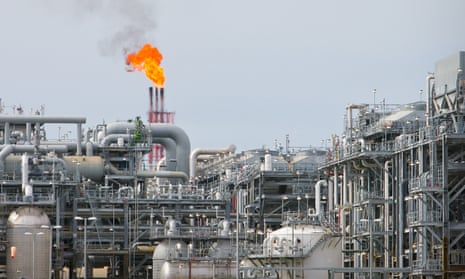Adam Bandt will declare the Greens are in a “powerful position” and the Liberals are “irrelevant” as he outlines his party’s position on Labor’s climate target bills during an address to the National Press Club on Wednesday.
With the Albanese government pressing for a vote on the legislation in the House of Representatives this week, the Greens met twice on Tuesday to consider their stance. Crossbenchers believe they have secured agreement for amendments including a five-year statutory review of the legislation and clearer reporting requirements for the minister and Climate Change Authority on how the country is cutting emissions.
Over several weeks of negotiation, the Greens have pushed Labor to ensure the 43% emissions reduction target for 2030 is a floor and not a ceiling, and for the inclusion of a climate trigger in environment laws that could lead to new developments being blocked due to their emissions.
The Greens also have an eye on fossil fuel subsidies. As positioning around the climate bill moves into end game, the Albanese government is facing calls to clarify the status of up to $2bn in subsidies and direct funding for the gas industry and other fossil fuel developments announced by the Coalition in its final 18 months in power.
The Morrison government made a series of funding pledges as part of what it called a “gas-fired recovery”, including money to open major gas fields such as the Beetaloo Basin in the Northern Territory, develop a gas supply hub and pipeline network and expand liquefied natural gas (LNG) production.
Money was also promised for work on new gas-fired power stations, to make “clean” hydrogen using gas and potentially include carbon capture and storage proposals at some developments.
According to an analysis by climate groups Lock the Gate and 350.org, at least $1.3bn and up to $1.9bn in direct funding for the gas industry was promised between September 2020 and the election. They found another $63m was pledged in indirect funding for federal agencies to support the expansion.
But the climate groups said there was a lack of clarity about how much of the funding had been actually spent, how much had been contracted but was yet to be handed out and how much was a pre-election promise.
They said there was particular uncertainty over the status of at least $300m in support for production of LNG for export, hydrogen made with gas and CCS infrastructure at Darwin. It was included in an $800m “energy and emissions reduction agreement” with the Northern Territory Labor government that also included support for the development of the Beetaloo Basin.
The Coalition on Tuesday formally resolved to vote against Labor’s climate targets bill after some debate in the shadow cabinet and the Coalition party room. Labor has the numbers to pass the bill in the lower house, but will need support from the Greens and one crossbencher to get the package through the Senate.
Shani Tager, a senior campaigner with 350.org, said the Coalition had been “throwing serious amounts of money at the gas industry” for highly polluting developments.
Tager called on Labor to “thoroughly review” all government commitments to put public money into fossil fuel development, starting by looking at the commitment to support the gas export industry in the NT.
“Labor went into the election saying it wouldn’t subsidise new fossil fuels,” she said. “Where the funding hasn’t gone out the door, the government should be investigating and doing everything they can to stop it.”
Carmel Flint, a campaign coordinator with Lock the Gate, said Labor had promised to deal with wasteful funding from the previous government and support for the gas industry “was a pretty big one”. She said the industry employed relatively few people, was already reaping windfall profits and the evidence showed opening up new gas basins “would be a climate disaster and shouldn’t be happening”.
An Albanese government spokesperson said it was considering the Morrison government’s policies as it prepared the budget in October. They said the measures it supported would be “consistent with the government’s priorities of delivering secure affordable energy, supporting greater investment in renewable energy, transmission and storage, and delivering our Powering Australia plan”.
Decisions on some projects on the climate groups’ list may already have been made. For example, the list included the Coalition’s promise of $600m for Snowy Hydro to build a gas-fired power plant at Kurri Kurri in New South Wales.
Labor said before the election it would also back the plant, but only if it was designed to run on a mix of gas and hydrogen from the outset and could eventually run entirely on green hydrogen, made with renewable energy. But this was expected to roughly double the cost of the plant, and led some analysts to doubt it would ever be built.
The resources minister, Madeleine King, has previously supported Labor maintaining funding for the Darwin Middle Arm industrial precinct that includes LNG and other gas-related development, but told the NT News it was being audited as part of the budget process. She has also supported opening up new gas fields “subject to independent scientific assessments and effective environmental regulation”.
Gas is a fossil fuel that is often described as having about the emissions of coal when burned for energy, but studies have found this underestimates its impact on the climate.
The head of the International Energy Agency last year backed scientific warnings that no new gas fields could be developed if the world was to limit global heating to 1.5C above pre-industrial levels. The UN secretary general, António Guterres, has made the same argument. In June, he said fossil fuel companies and the banks that finance them “have humanity by the throat”.
